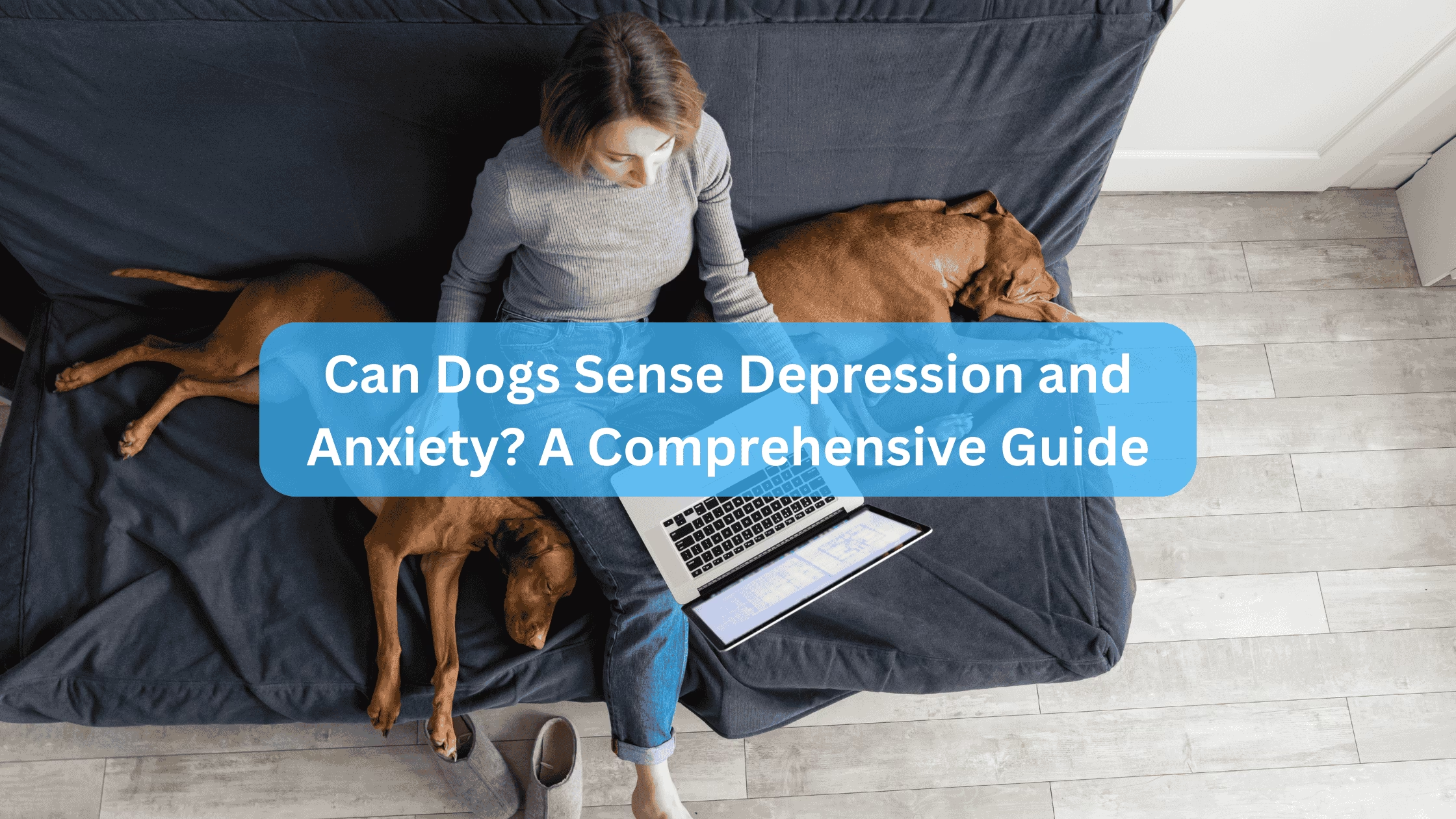Understanding the emotional bond between humans and dogs has become a significant area of research and interest. Many dog owners often wonder, can dogs sense depression and anxiety? This question is not only rooted in anecdotal evidence but is also supported by scientific research.
In this guide, we will explore the capabilities of dogs in detecting human emotions, especially depression and anxiety, the mechanisms behind these abilities, and the implications for mental health support.
Understanding Canine Senses
Dogs perceive the world differently than humans do. Their heightened senses allow them to detect emotions and physiological changes in their human companions.
The Power of Smell
- Olfactory Sensitivity: Dogs have approximately 300 million scent receptors compared to a human’s 6 million. This incredible sense of smell enables them to detect subtle changes in human body chemistry associated with emotional states.
- Detection of Stress Hormones: Research indicates that dogs can identify volatile organic compounds released during stress. A study showed that dogs could distinguish between sweat samples taken from humans under stress versus those at baseline levels with an accuracy ranging from 90% to nearly 97%[3][4].
Visual and Auditory Cues
- Facial Expressions: Dogs are adept at reading human facial expressions. They can recognize emotions such as happiness, sadness, anger, and fear. A study demonstrated that dogs spent more time looking at faces that matched emotional audio cues[5].
- Vocal Tones: Dogs are sensitive to changes in vocal tone. They can discern when a person is upset or anxious based on the pitch and volume of their voice.
How Dogs Sense Depression and Anxiety
Emotional Contagion
Dogs are known to experience emotional contagion, where they mirror the emotional states of their owners. For instance, if a person is sad or anxious, their dog may exhibit similar behaviors—becoming withdrawn or anxious themselves[2].
Physiological Changes
Humans release specific pheromones and hormones when experiencing stress or anxiety. Dogs can detect these changes through their acute sense of smell. The presence of stress hormones like cortisol can trigger a dog’s instinctual response to comfort their owner[1][4].
Behavioral Responses
When a dog senses that their owner is depressed or anxious, they may respond in various ways:
- Increased Affection: Many dogs will become more affectionate, seeking to cuddle or stay close to their owners.
- Protective Behavior: Some dogs may adopt a protective stance, watching over their owners more closely when they sense distress.
- Distraction Techniques: Dogs often engage in playful behavior or bring toys to encourage interaction, helping distract their owners from negative thoughts[5].
The Impact of Canine Companionship on Mental Health
Emotional Support
Having a dog provides non-judgmental companionship. Studies have shown that pet ownership can significantly reduce feelings of loneliness and isolation, which are common among people suffering from depression[4][5].
Encouragement for Physical Activity
Dogs require regular exercise, which encourages their owners to engage in physical activity. This not only benefits the dog’s health but also helps improve the owner’s mood through increased endorphin production.
Routine and Structure
Dogs thrive on routine. Caring for a pet can provide structure in a person’s day-to-day life, which is often beneficial for those dealing with depression or anxiety. The responsibility of walking, feeding, and playing with a dog can instill a sense of purpose[1][4].
Common Questions About Dogs Sensing Depression and Anxiety
Can all dogs sense depression?
Not all dogs are equally sensitive; some breeds are more attuned to human emotions than others. Breeds known for their empathetic nature include Labrador Retrievers, Golden Retrievers, and Cavalier King Charles Spaniels.
How do I know if my dog senses my depression?
Signs that your dog may sense your emotional state include:
1. Following you around more than usual.
2. Seeking physical closeness or cuddling.
3. Displaying concern when you cry or show distress.
Can dogs help treat depression?
While dogs cannot replace professional mental health treatment, they can serve as valuable companions that provide comfort and emotional support during difficult times.
Also Read: Can Dogs Eat Hummus? A Comprehensive Guide
Also Read: Can Dogs Eat Crab Apples? A Comprehensive Guide
Unique Insights from Research Studies
Several studies have explored the relationship between dogs and human emotions:
- The University of Lincoln Study: This research found that dogs could match visual cues (facial expressions) with auditory cues (vocal tones) to interpret human emotions effectively[5].
- Stress Detection Study: Another significant study demonstrated that trained dogs could accurately identify stress-related odors from humans with high accuracy rates[3][4].
These findings underscore the potential for utilizing trained therapy dogs in therapeutic settings for individuals dealing with mental health issues.
Conclusion: Can Dogs Sense Depression and Anxiety?
In summary, while dogs may not diagnose depression or anxiety as healthcare professionals do, they possess an extraordinary ability to sense these emotional states through their acute senses.
Their presence offers comfort, companionship, and even motivation for physical activity—critical components for mental well-being.
If you suspect that your dog shows signs of distress due to your emotional state or if you’re struggling with depression or anxiety yourself, consider reaching out to a mental health professional or a veterinarian.
Together, you can explore ways to enhance both your well-being and your dog’s happiness.
By fostering this unique bond with your canine companion, you not only enrich your life but also create an environment where both you and your dog can thrive together emotionally.
Sources:
- https://www.petmd.com/dog/behavior/surprising-things-your-dog-can-sense
- https://pmc.ncbi.nlm.nih.gov/articles/PMC9518869/
- https://www.freshpet.com/blog/can-dogs-sense-human-emotions







